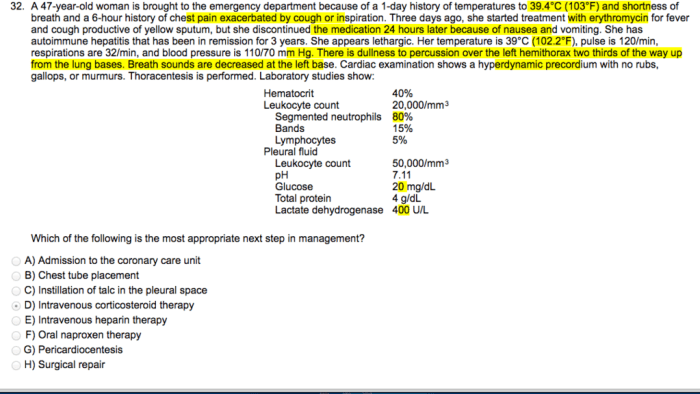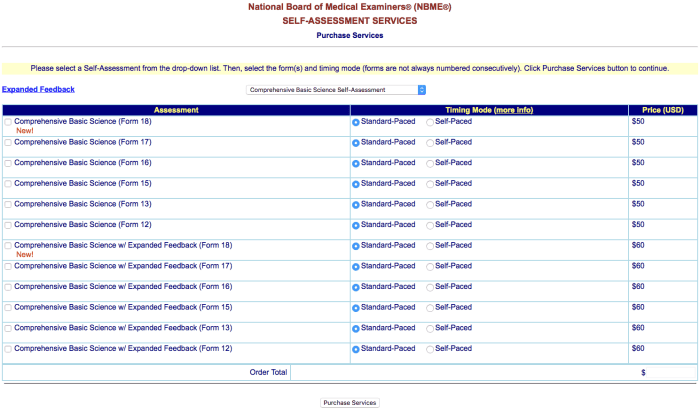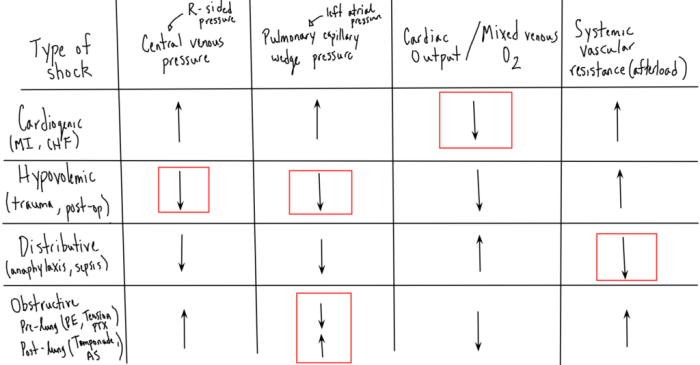Embark on a journey to conquer the nbme obgyn form 7 answers and excel in your medical practice. Dive into a comprehensive guide that unveils the intricacies of the exam, equips you with effective preparation strategies, and provides invaluable insights to help you overcome challenges and achieve your desired score.
Prepare to unravel the secrets of nbme obgyn form 7 answers, as we delve into the depths of its structure, content, and strategies for success.
Key Features of NBME OBGYN Form 7

The NBME OBGYN Form 7 is a comprehensive exam designed to assess the knowledge and skills of medical students and residents in the field of obstetrics and gynecology. It is a standardized exam that consists of multiple-choice questions and is administered by the National Board of Medical Examiners (NBME).
The exam is divided into two sections, with a total of 150 questions. The first section consists of 120 multiple-choice questions, while the second section consists of 30 case-based questions. Candidates are given 4 hours to complete the exam.
Topics Covered
The NBME OBGYN Form 7 covers a wide range of topics in obstetrics and gynecology, including:
- Obstetrics
- Gynecology
- Reproductive endocrinology
- Infertility
- Medical ethics
Strategies for Preparing for NBME OBGYN Form 7
To excel in NBME OBGYN Form 7, a comprehensive preparation strategy is crucial. This involves utilizing effective study techniques, managing time wisely during the exam, and maintaining composure to combat stress and anxiety.
Effective Study Techniques
Prioritize high-yield topics from credible sources like textbooks, review books, and reputable websites. Engage in active recall through flashcards, practice questions, and self-testing. Utilize spaced repetition to enhance retention. Create a dedicated study schedule and stick to it as much as possible.
Time Management
During the exam, allocate time wisely. Answer questions you are confident about first, and return to challenging ones later. Utilize the provided scratch paper for calculations and diagrams. Practice time management by taking timed practice exams to improve your pacing.
Managing Stress and Anxiety
Before the exam, get adequate rest, maintain a healthy diet, and exercise regularly. Practice relaxation techniques such as deep breathing or meditation to calm your nerves. During the exam, stay positive, focus on one question at a time, and don’t panic if you encounter a difficult question.
Detailed Analysis of NBME OBGYN Form 7 Content: Nbme Obgyn Form 7 Answers

The NBME OBGYN Form 7 exam covers a wide range of topics within obstetrics and gynecology. The following table provides a detailed analysis of the content tested on the exam, including the percentage of questions covered for each topic.
Overall, the exam questions are designed to assess a candidate’s knowledge and understanding of the core principles and concepts in obstetrics and gynecology. The questions vary in depth and complexity, with some requiring a more detailed understanding of the material than others.
Obstetrics
- Antepartum Care(20%): Questions in this section assess knowledge of prenatal care, including screening tests, fetal monitoring, and management of common pregnancy complications.
- Labor and Delivery(25%): This section covers topics such as labor induction, pain management, and postpartum care.
- Fetal Monitoring(15%): Questions in this section evaluate a candidate’s ability to interpret fetal heart rate tracings and identify potential problems.
- Newborn Care(10%): This section covers topics such as resuscitation, feeding, and common newborn problems.
- Other(10%): This section includes questions on topics such as genetics, medical ethics, and quality improvement.
Gynecology
- Benign Gynecologic Conditions(20%): Questions in this section assess knowledge of common gynecologic conditions such as uterine fibroids, endometriosis, and pelvic inflammatory disease.
- Malignant Gynecologic Conditions(15%): This section covers topics such as cervical cancer, ovarian cancer, and endometrial cancer.
- Contraception(15%): Questions in this section evaluate a candidate’s knowledge of different contraceptive methods and their use.
- Infertility(10%): This section covers topics such as evaluation and management of infertility.
- Other(10%): This section includes questions on topics such as sexual health, menopause, and medical ethics.
Common Pitfalls and Challenges in NBME OBGYN Form 7

The NBME OBGYN Form 7 presents unique challenges that can trip up even well-prepared candidates. Identifying and understanding these pitfalls is crucial for success on the exam.
One common pitfall is the over-reliance on rote memorization. While a solid foundation in OBGYN knowledge is essential, candidates who focus solely on memorizing facts may struggle to apply their knowledge to complex clinical scenarios. It is important to develop a deep understanding of concepts and their interrelationships.
If you’re grinding through nbme obgyn form 7 answers, you might as well take a break and learn something else, like the fact that a cable marked cl2 is a type of electrical cable designed for use in dry locations.
Now that’s a useful tidbit for your next trivia night! Back to those nbme obgyn form 7 answers…
Time Management
Time management is another critical challenge. The exam consists of 120 questions to be completed in 2 hours and 40 minutes, leaving an average of 1 minute and 30 seconds per question. Candidates who struggle with time management may find themselves rushing through questions, increasing the risk of errors.
Misinterpreting Questions
The NBME OBGYN Form 7 questions can be complex and may contain multiple layers of information. Candidates who fail to read questions carefully may misinterpret their meaning, leading to incorrect answers. It is important to take the time to understand the question fully before attempting to answer it.
Neglecting Clinical Reasoning, Nbme obgyn form 7 answers
The NBME OBGYN Form 7 emphasizes clinical reasoning and problem-solving skills. Candidates who focus solely on memorizing facts may struggle to apply their knowledge to clinical scenarios. It is important to develop strong clinical reasoning skills to effectively evaluate patient information and make appropriate management decisions.
Comparison with Other NBME OBGYN Forms

NBME OBGYN Form 7 shares similarities and differences with other recent forms, including Form 6 and Form 5. Understanding these variations can help candidates prepare effectively.
Content Coverage
- Form 7 covers a broad range of OBGYN topics, comparable to other forms.
- However, Form 7 places a slightly greater emphasis on certain areas, such as reproductive endocrinology and infertility.
Difficulty Level
- Form 7 is generally considered to be on par with other NBME OBGYN forms in terms of difficulty.
- Candidates should expect a mix of straightforward and challenging questions.
Overall Structure
- Form 7 follows the same overall structure as other NBME OBGYN forms, with multiple-choice questions and case-based scenarios.
- The number of questions and the time allotted are consistent with other forms.
Unique Features
- Form 7 incorporates a slightly higher proportion of case-based scenarios compared to some previous forms.
- It also includes a small number of questions that require candidates to interpret and analyze data.
Context within NBME OBGYN Exams
Form 7 fits within the broader context of NBME OBGYN exams as a comprehensive assessment of knowledge and skills in the field.
By understanding the similarities and differences between Form 7 and other recent forms, candidates can tailor their preparation strategies accordingly and improve their chances of success.
General Inquiries
What is the structure of the nbme obgyn form 7 exam?
The nbme obgyn form 7 exam consists of 200 multiple-choice questions divided into 8 blocks of 25 questions each. Candidates are given 2 hours and 40 minutes to complete the exam.
What topics are covered on the nbme obgyn form 7 exam?
The nbme obgyn form 7 exam covers a wide range of topics in obstetrics and gynecology, including prenatal care, labor and delivery, postpartum care, gynecologic oncology, and reproductive endocrinology.
What are some tips for preparing for the nbme obgyn form 7 exam?
To prepare for the nbme obgyn form 7 exam, it is important to study a comprehensive review book, take practice exams, and review your notes regularly. It is also helpful to join a study group or work with a tutor.